As an audiologist with years of experience fitting hearing aids, I can confidently say that Phonak and Widex are two of the most trusted names in the industry. Finding the right hearing aid for your specific needs can be overwhelming, so I'm here to help you navigate the world of hearing aid brands, starting with Phonak and Widex. Both provide excellent hearing support, but who will be crowned the champion? These companies are known for their cutting-edge technology and exceptional quality, but you might wonder how they compare head-to-head. Whether you're a seasoned hearing aid wearer or a first-time buyer, read on for an in-depth comparison of the latest technology from these two contenders. In this article, I will be breaking down the different aspects of each brand to help you make an informed decision.
The Contenders: Phonak vs. Widex
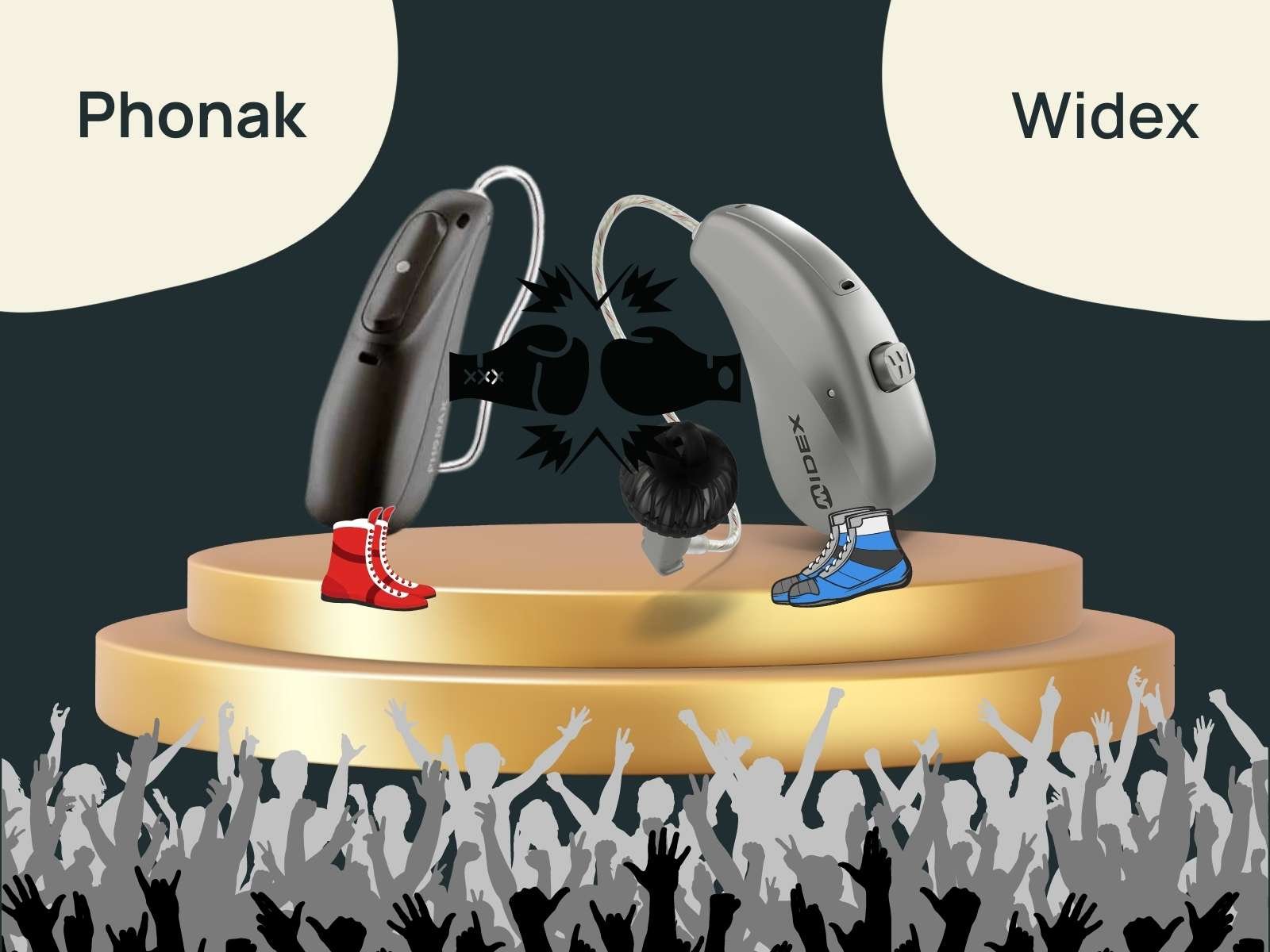
When it comes to technology, both brands are on top of their game.
In the red corner, we have Phonak, a Swiss powerhouse with a legacy of over 70 years in the industry. Phonak packs a punch with advanced features like health trackers, motion sensors, and universal Bluetooth. Their innovative technology and impeccable sound quality make them a formidable contender.
In the blue corner, we have Widex, a Danish powerhouse known for natural, pleasant sound quality and superior music fidelity. With over 50 years of experience, Widex is no stranger to pushing the boundaries of innovation. They were the first to integrate Artificial Intelligence into their products, setting the bar high for the industry.
The air is charged with anticipation as these two giants square off in the ring. Let the battle of supremacy for the best hearing aid begin!
Our Favorite Local Clinic Network
- ZipHearing pairs you with a local clinic at pre-negotiated prices
- Offers top brands like Phonak, Widex, Signia, Oticon, Starkey and ReSound
- Best for folks who are looking for lower prices on prescription products
- Prices from $2,500-$5,000 for a pair of hearing aids with local clinic care
Our Favorite Telecare Provider
- Get top brands like ReSound, Phonak, Signia, and Oticon with remote programming and lifetime care
- Earlux is the nation's leading brand-agnostic telecare provider
- Earlux offers unlimited, lifetime care from a licensed audiologist
- No in-person clinic visits are required
- Best for busy schedules or rural settings
Round One | Styles
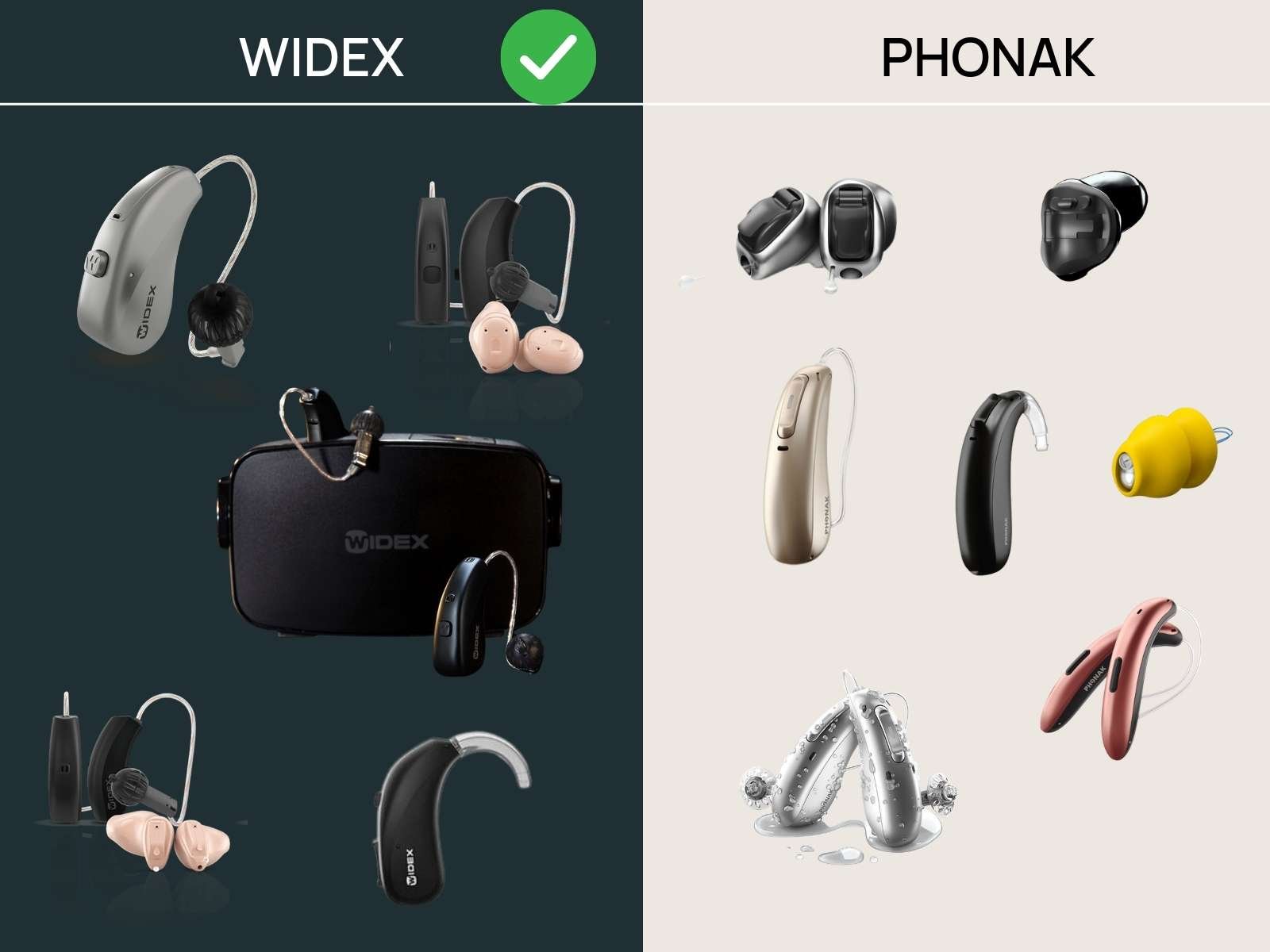
Phonak's design aesthetics are dominated by a visually pleasing, rounded, teardrop-shaped receiver-in-canal (RIC) hearing aid. Although the overall look largely mirrors its previous Paradise generation, introducing a new model, the Slim, brings a refreshing change. This slim RIC design, akin to Signia's Styletto hearing aid, is an attractive choice for those seeking a chic, modern appearance. Adding to its user-friendliness, Phonak also features a toggle switch, enabling manual volume or program adjustments for users who prefer this to the Smartphone app. This switch offers multiple functionalities, including up/down and short press or long press.
However, not all features are flawless. The double-tap feature, intended for answering calls or starting/stopping streaming, can occasionally be tricky to operate, either failing to trigger or triggering at an inopportune moment. Luckily, a 'demo mode' allows users to practice this feature in the clinic. This mode provides instant feedback on whether the double tap was successful. Despite these minor quirks, Phonak's style and design generally garner positive feedback.
Conversely, Widex offers the smallest rechargeable RIC on the market but with a slightly boxier shape. Continuing with its offerings, Widex has more to bring to the table. The Widex Moment line, besides the Sheer, includes other form factors such as the wireless Completely-in-Canal (CIC), In-the-Canal (ITC), and In-the-Ear (ITE) hearing aids.
To keep up with the trend of compact and discrete designs, Widex has recently redesigned the internal components of these custom hearing aids. The outcome of this redesign is a 40% smaller component, resulting in a sleeker, more discreet appearance that many wearers appreciate. Widex doesn't stop here. They also offer a Behind-the-Ear (BTE) model in their Moment line for those who need more power. Regardless of the form factor, all Widex hearing aids promise the same exceptional sound quality, maintaining their commitment to superior listening experience.
This round's a close call, but Widex takes the win for its compact and discrete design.
Round Two | Bluetooth Connection

Phonak emerges as a versatile player in the Bluetooth connectivity face-off, accommodating a broad range of Bluetooth-enabled devices. Whether you're an Android enthusiast, an iPhone loyalist, or even an avid user of laptops or iPads, Phonak has your back. Its Bluetooth connection effortlessly pairs with any of these devices, creating a seamless experience. One standout capability that patients find particularly advantageous is Phonak's ability to maintain simultaneous connections with multiple devices. And for those who value hands-free options when dialing or receiving phone calls, Phonak caters to both Android and iPhone users. This makes Phonak a strong contender in this round.
Widex, not to be outdone, also demonstrates strong Bluetooth capabilities. Widex hearing aids can connect with both iPhone and compatible Android devices, ensuring a broad user base can access their technology. The brand shines particularly bright regarding hands-free call support for iPhone users. Although Widex doesn't support hands-free calls for Android users, it does offer streaming capabilities which are a significant advantage—the round ends in a close contest, with both brands exhibiting robust Bluetooth connectivity.
Phonak emerges as the clear winner in the Bluetooth connectivity round. With its ability to connect to multiple devices simultaneously and provide hands-free options for both Android and iPhone users, Phonak proves its dominance in tech-savvy hearing aid solutions.
Round Three | App Controls
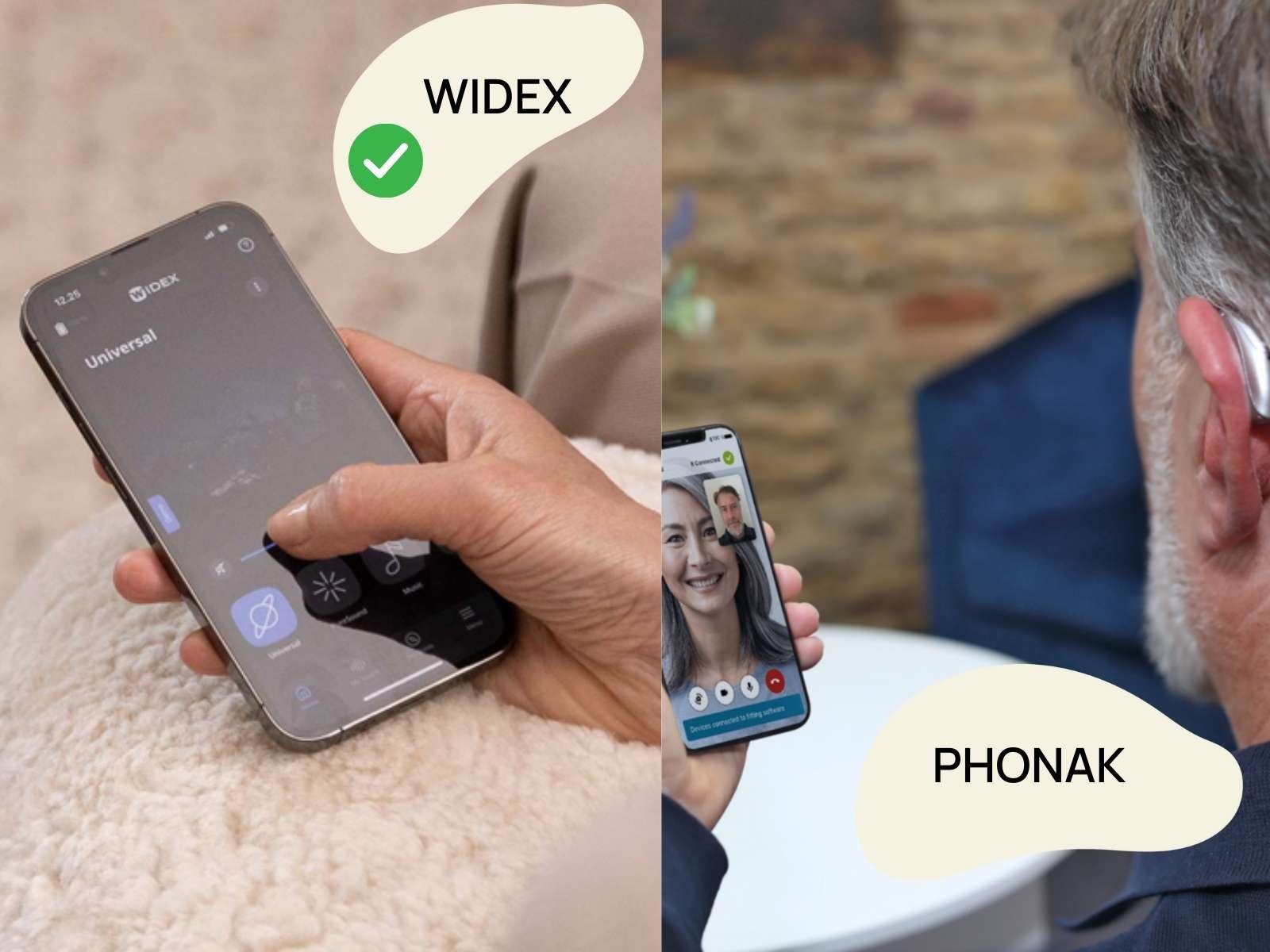
Both brands offer apps that allow you to control your hearing aids through your Smartphone.
With Phonak's MyPhonak app, users gain autonomy over their devices. Acting as a remote control, it allows users to manipulate the volume, switch programs, and keep tabs on their hearing health. If you're looking for remote programming, Phonak integrates remote programming capability into one easy-to-use app. Users can even craft their own custom programs to tailor the sound to their preferences. However, there is a catch: these self-fashioned programs will vanish once you sync with the hearing aid software at the clinic. A potential downside for those who value security, the app does not include a feature for tracking lost hearing aids.
In contrast, the Widex app, known as the Widex MOMENT™ app, offers many controls and personalization options that elevate user experience. Acting as a remote control, the app lets users adjust the volume of their hearing aids, change programs, and even personalize the sound to their unique hearing needs.
The standout feature is the sound personalization option, which guides users through a personalized listening experience in real-world environments. The Widex app also includes a "Find My Hearing Aids" feature, a lifesaver for those who frequently misplace their devices. However, remote programming will require a second app and a neck loop to set up. Overall, these app controls give Widex an edge regarding personalization, security, and keeping the hearing aids up-to-date.
In the contest of app controls, Widex indisputably clinches the victory, offering a suite of features that secure Widex's triumph: personalization, security, and convenience. The sound personalization option empowers users to fine-tune their sound settings in real-world situations, providing a bespoke listening experience. On top of that, the "Find My Hearing Aids" feature brings significant relief for those who often misplace their devices, showing the last known location of the hearing aids. These distinctive features make Widex the undisputed winner of this round, demonstrating the brand's commitment to delivering a superior, user-centric experience.
Round Four | Special Features
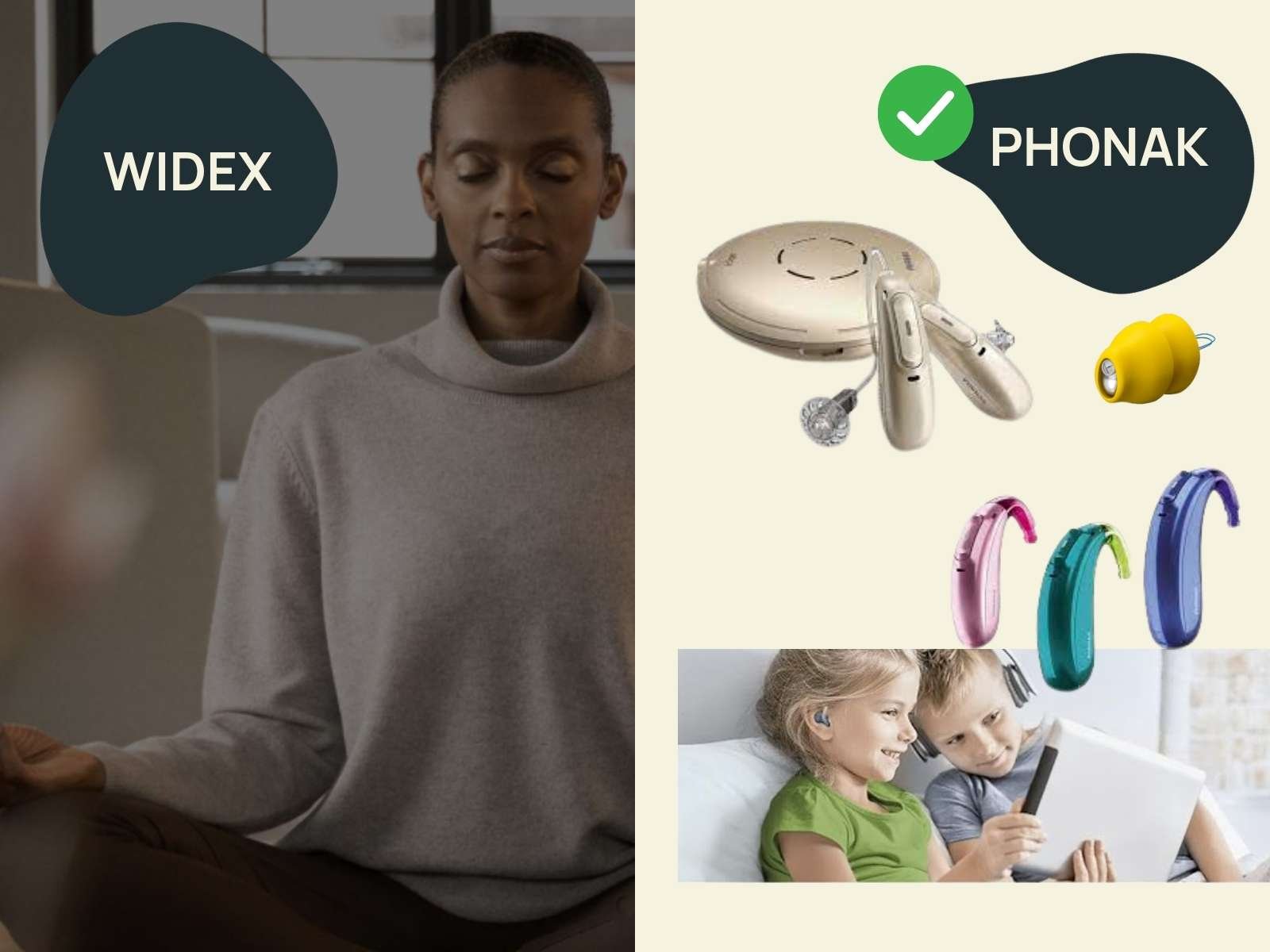
Both brands have unique features that set them apart.
Starting with Widex, they really know how to stand out in the game. Their "Made by You" and "Made for You" AI personalization options are game-changers. These advanced AI algorithms adapt to your specific hearing needs, giving you a truly personalized sound experience. You can fine-tune your hearing aids to match your preferences in any listening environment. Plus, Widex has something special for those who battle with tinnitus. Their tinnitus masking option plays soothing sounds to relieve that constant ringing. Widex proves they're all about innovation, customization, and user comfort.
With these unique features, Widex firmly positions itself as a formidable player in this contest, demonstrating its dedication to innovation, personalization, and user comfort.
But don't count Phonak out just yet. They've got an impressive lineup of special features too. From a wide range of color options to pediatric options for little ones, they've got everyone covered. And if you want discretion, Phonak offers invisible hearing aids that blend seamlessly with your ear canal. These babies are practically undetectable! And for all you active folks out there, Phonak has designed hearing solutions that can keep up with your active lifestyle without compromising on sound quality. They know how to deliver versatile, user-centric solutions.
When it comes to special features, Phonak takes the crown. They've got something for everyone, whether you care about aesthetics, have specific needs, or want the most discreet option out there. Their commitment to versatility and personalization makes them a tough competitor.
Round Five | Sound Quality

Lastly, the sound quality of a hearing aid is what matters most.
Phonak indeed excels when it comes to sound quality. Their hearing aids are renowned for delivering a sharp, percussive sound quality that provides crisp clarity, ensuring users never miss a beat. What sets Phonak apart is its innovative use of AI technology. This advanced technology automatically adapts and optimizes based on the user's surroundings, resulting in smooth adjustments that provide consistent sound quality regardless of the environment. This intelligent feature underscores Phonak's commitment to delivering an unrivaled auditory experience, further reinforcing its position as a leader in the hearing aid industry.
But let's not forget about Widex. They excel in providing a natural, mellow sound quality that is perfect for those with mild to moderate hearing loss. Their ZeroDelay technology reduces sound processing delay, resulting in a more authentic listening experience. And music lovers, you're in for a treat with Widex. Their rich and immersive sound quality creates a sense of ease and comfort.
In this round, Widex emerges as the victor in terms of sound quality. I really appreciate their natural, mellow sound quality, particularly for those with mild to moderate hearing loss. Plus, their sound quality for music lovers is top-notch. This emphasis on natural sound quality and an authentic listening experience gives Widex the edge in this round.
It's a close match, folks, but in the end, there can only be one champion. While the competition was fierce, with both brands bringing stellar features to the table, Widex ultimately clinches the title. With its focus on personalization and delivering an authentic listening experience, Widex has come out on top in this highly competitive contest.
The match was indeed a close one, with Phonak impressing with its extensive range of color options, children's hearing solutions, and robust sound quality anchored in AI technology. However, Widex is inching ahead with its user-centric AI personalization options, soothing options for tinnitus sufferers, and notably natural, mellow sound quality, particularly suited for individuals with mild to moderate hearing loss. This focus on personalization and delivering an authentic listening experience has given Widex the edge, making it the champion in this highly competitive contest.
Conclusion:
To sum it up, Phonak and Widex offer exceptional hearing aid products, each with unique strengths. When choosing between the two, it's essential to consider your personal needs and preferences. Phonak is an excellent choice for versatile Bluetooth options and a sleek design. Still, if you're looking for a natural sound and unique features like sound personalization and tinnitus masking, Widex might be the better option. At the end of the day, you may square these two contenders differently depending on what you value most. Check out our other resources to help you make the best decision.



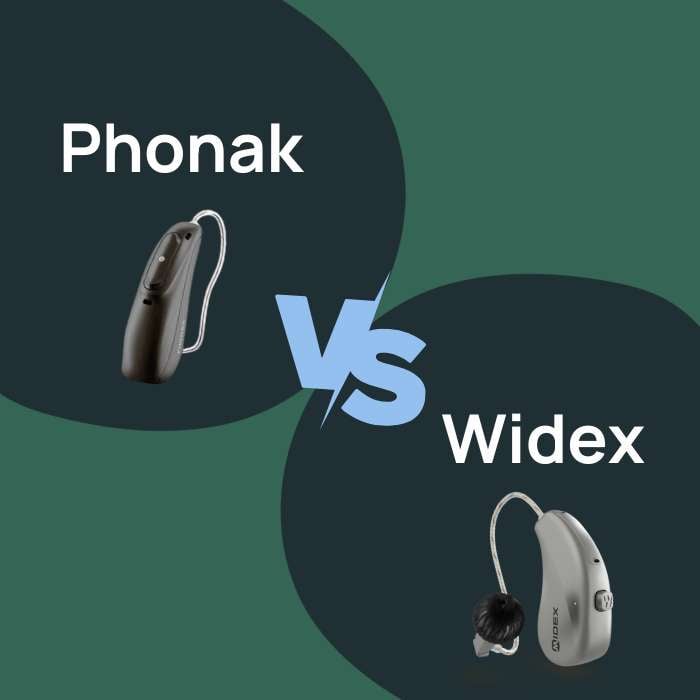
.png)
.png)


